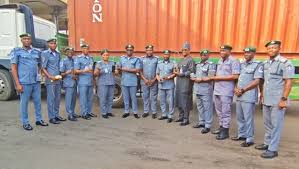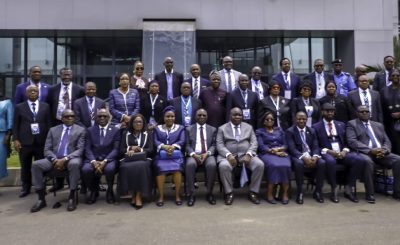By Stephen Ubanna
When Akutah Pius Ukeyima, Executive Secretary and Chief Executive Officer, CEO, Nigerian Shippers Council, NSC, hinted of the maritime agency’s plans to implement the International Cargo Tacking Note, ICTN, by the second quarter of 2025, at the nation’s seaports, under the ministry of marine and blue economy, nobody took him seriously.
The NSC, helmsman, had revealed that due the non- implementation of ICTN, project as planned over the years had resulting in Nigeria losing the North American country of the United States, US$2.5 billion over the pas five years, on the average of US$500 million annually.
Stakeholders had argued that the implementation of the CTN, at the nation’s seaports which includes the Lagos port of Apapa, Tin-can Island, Port Multi-services Terminal Limited, Kirikiri Lighter Terminal phases I and II and the Eastern ports of Warri, Calabar, Onne and Rivers port, Port Harcourt would reduce delays in cargo shipment and cut costs for importers. They had argued that it would make the process more efficient, transparent and improve trade facilitation.
Many believes that with the planned introduction of the CTN, at the nation’s seaports, it would go a long way to curb to smuggling and provide an accurate reliable system to better track and manage cargoes released at the ports, thus reducing risk of diversion, theft, loss or damage, as had been the past.

Ukeyima, the NSC, Executive Secretary and CEO, may have proved pundits right that the agency does not have the financial muscle to carry out such capital-intensive technology based ICTN project at the Lagos and eastern ports, leaving the coast clear, for Compt. Emmanuel Oluwadre Oshoba, Area Controller, Apapa Command, at the instance of Bashir Adewale Adeniyi, Ph.D, the Customs Comptroller General, CGC, to implement.
Taking advantage of the ongoing reforms at the nation’s seaports which was said to have resulted in the introduction of Advance Ruling System and Authorised Economic Operator, AEO, and other electronically based services, Compt. Oshoba, had launched the Electronic Cargo Tracking System, ECTS, at the Apapa port, described as a digital innovation aimed at enhancing national security, boosting the Command revenue generation and facilitating seamless trade. Being a pilot phase of the ECTS initiative , it expected to be extended to other Comands across the country like the B’odogwu platform.
John Tunde Ayagbalo, a Superintendent of Customs, and the Apapa Command spokesperson had confirmed that that the pilot phase of the initiative was conducted using a Container designated for the Kano/Jigawa Command, in the north western geopolitical region on Wednesday, November 5, 2025.
Describing it as the first practical deployment of the technology in real-time cargo monitoring outside Lagos, conducted by the Apapa Command, he noted that it was very reliable and transparent.

It would be recalled that during the Launching of the ECTS platform, at the Apapa port, Compt. Oshoba, who was radiating with smiles, had described the facility as ‘’a strategic innovation that actually enables real-time monitory of cargo movement’’ from the point of departure to the final destination to any part of the country.
According to the Customs Comptroller, the new system uses electronic seals and handheld devices to track containers released from the port, ensuring transparency, preventing tampering by unscrupulous elements and eliminating diversion of cargoes in transit.
Just PTML, had served as the pilot phase of the B’odogwu facility, the Apapa Command Area Controller, was said to have told stakeholders at the Launching of the ECTS, on November 5, 2025, the Command is serving the pilot stage for the nationwide rollout the initiative.
He was emphatic that the new technology would drastically reduce the need for physical escorts of transit Containers by officers as monitoring of such cargoes can now be done in the Command ‘’electronically’’. This is bad new news for the criminally-minded agents and their Customs Collaborators who derive joy in diverting cargoes to unknown locations to tamper with the contents that it is no longer going to be business as usual.
An elated Compt. Oshoba, had commended the CGC, who recently led a delegation to the Customs Administration and impressed with their cargo clearing processes for coming out with such an idea, describing him as ‘’a reform-driven administrator who has championed automation and innovation’’ in Nigeria Customs Service, NCS, over the last two years.
The Apapa Command, Area Controller, who had served as Comptroller, Customs Intelligence Unit, CIU, Customs Headquarters, under the CGC’s office, at Abuja, the Federal Capital Territory, FCT, had disclosed that that several Customs Administrations in Asia, Europe, North and South America including the African Continent, had already implemented the ECTS.
He had alluded to the fact that CGC Adeniyi, as the current chairperson of the WCO, is doing everything within his powers to ensure that Nigeria adopts similar modern tools ‘’to improve its trade environment’’.
Aondona Christpher Fanyam, a Customs Comptroller at the Customs Headquarters and Head of B’odogwu, had explained t the launching of the ECTS, in Apapa port, that before the transit container reaches Kano/Command, premises, in the ancient town of Kano, it would remain sealed and cannot be opened until proper authorization is confirmed at the destination.
He had said that ‘’ the ECTS provides three methods for unlocking a container to forestall fraud which could be achieved ‘’remotely through the central control system’’. This is addition to the use of handheld device locally such as a mobile phone used by trained officers or by using a physical unlocking card designed specifically for use at the destination’’.
The B’Odogwu, Comptroller, had explained that the layered access options for opening a transit container are part of the systems built in safeguards to prevent unauthorized tampering or diversion during transit.
He may have gladdened the heart of traders taking their transit Containers within or outside Logos state that the combination of the remote-control method to open such a container in its specifie destination, handheld verification or and a physical card ensures that only properly authorized personnel can release such cargoes, reinforce cargo integrity and strengthen overall security and revenue protection for the Service.

Rosemary Ebele Wenceslas, a Chief Superintendent of Customs, and the Team Leader of the training Unit, had volunteered information that the Service had so far trained 12 officers participating in the pilot phase of the ECTS, at the Apapa Command.
She had confirmed that ECTS officers, trained were drawn from the Rapid Response Unit of the Federal Operations Unit, FOU, Zone A, Ikeja, Lagos, and the Apapa Command, Enforcement Unit. Given an insider information, she had that the officers were made to undergo intensive training ‘’to ensure that they are properly equipped and prepared to manage and operate the new cargo tracking technology efficiently without complaints’’.
The Value News online Magazine was informed that ‘’all the standard operating procedures, SOPs, related to the ECTS, have been clearly communicated to the trained officers by the Team Leader, to ensure smooth implementation of the ECTS initiative.
The ECTS, Team Leam Leader had assured Nigerians that there was no cause for alarm, noting with the knowledge and technical capacity that had been acquired by the trained officers, they are now well equipped and ready’’ to deploy the services effectively by ensuring that the pilot stage of the initiative achieves its objectives of advanced cargo monitoring, security and trade facilitation’’.






